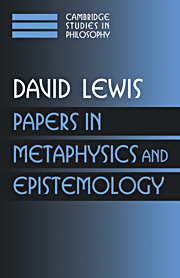Book contents
- Frontmatter
- Contents
- Introduction
- 1 New work for a theory of universals
- 2 Putnam's paradox
- 3 Against structural universals
- 4 A Comment on Armstrong and Forrest
- 5 Extrinsic properties
- 6 Defining ‘intrinsic’ (with Rae Langton)
- 7 Finkish dispositions
- 8 Noneism or allism?
- 9 Many, but almost one
- 10 Casati and Varzi on holes (with Stephanie Lewis)
- 11 Rearrangement of particles: Reply to Lowe
- 12 Armstrong on combinatorial possibility
- 13 A world of truthmakers?
- 14 Maudlin and modal mystery
- 15 Humean Supervenience debugged
- 16 Psychophysical and theoretical identifications
- 17 What experience teaches
- 18 Reduction of mind
- 19 Should a materialist believe in qualia?
- 20 Naming the colours
- 21 Percepts and color mosaics in visual experience
- 22 Individuation by acquaintance and by stipulation
- 23 Why conditionalize?
- 24 What puzzling Pierre does not believe
- 25 Elusive knowledge
- Index
25 - Elusive knowledge
Published online by Cambridge University Press: 08 February 2010
- Frontmatter
- Contents
- Introduction
- 1 New work for a theory of universals
- 2 Putnam's paradox
- 3 Against structural universals
- 4 A Comment on Armstrong and Forrest
- 5 Extrinsic properties
- 6 Defining ‘intrinsic’ (with Rae Langton)
- 7 Finkish dispositions
- 8 Noneism or allism?
- 9 Many, but almost one
- 10 Casati and Varzi on holes (with Stephanie Lewis)
- 11 Rearrangement of particles: Reply to Lowe
- 12 Armstrong on combinatorial possibility
- 13 A world of truthmakers?
- 14 Maudlin and modal mystery
- 15 Humean Supervenience debugged
- 16 Psychophysical and theoretical identifications
- 17 What experience teaches
- 18 Reduction of mind
- 19 Should a materialist believe in qualia?
- 20 Naming the colours
- 21 Percepts and color mosaics in visual experience
- 22 Individuation by acquaintance and by stipulation
- 23 Why conditionalize?
- 24 What puzzling Pierre does not believe
- 25 Elusive knowledge
- Index
Summary
We know a lot. I know what food penguins eat. I know that phones used to ring, but nowadays squeal, when someone calls up. I know that Essendon won the 1993 Grand Final. I know that here is a hand, and here is another.
We have all sorts of everyday knowledge, and we have it in abundance. To doubt that would be absurd. At any rate, to doubt it in any serious and lasting way would be absurd; and even philosophical and temporary doubt, under the influence of argument, is more than a little peculiar. It is a Moorean fact that we know a lot. It is one of those things that we know better than we know the premises of any philosophical argument to the contrary.
Besides knowing a lot that is everyday and trite, I myself think that we know a lot that is interesting and esoteric and controversial. We know a lot about things unseen: tiny particles and pervasive fields, not to mention one another's underwear. Sometimes we even know what an author meant by his writings. But on these questions, let us agree to disagree peacefully with the champions of ‘post-knowledgeism’.
The most trite and ordinary parts of our knowledge will be problem enough.
For no sooner do we engage in epistemology - the systematic philosophical examination of knowledge - than we meet a compelling argument that we know next to nothing. The sceptical argument is nothing new or fancy. It is just this: it seems as if knowledge must be by definition infallible.
Information
- Type
- Chapter
- Information
- Papers in Metaphysics and Epistemology , pp. 418 - 446Publisher: Cambridge University PressPrint publication year: 1999
Accessibility standard: Unknown
Why this information is here
This section outlines the accessibility features of this content - including support for screen readers, full keyboard navigation and high-contrast display options. This may not be relevant for you.Accessibility Information
- 19
- Cited by
